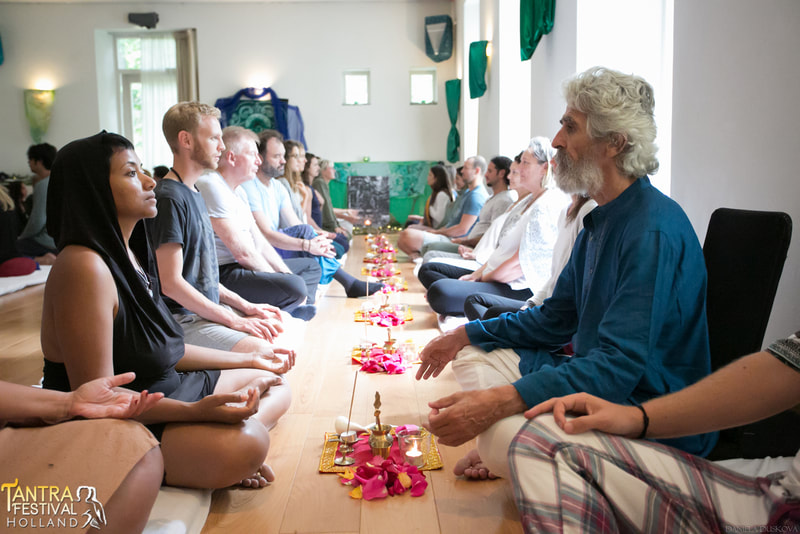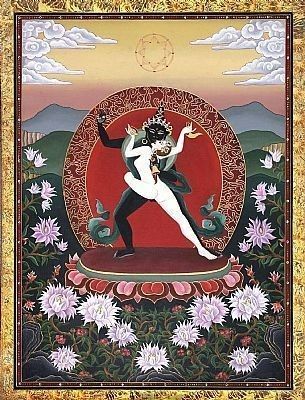Tantra
/ˈtantrə/
noun
1. Hindu or Buddhist mystical or magical text, dating from the 7th century or earlier.
2. Adherence to the doctrines or principles of the tantras, involving mantras, meditation, yoga, and ritual.
Definitions from Oxford Languages
/ˈtantrə/
noun
1. Hindu or Buddhist mystical or magical text, dating from the 7th century or earlier.
2. Adherence to the doctrines or principles of the tantras, involving mantras, meditation, yoga, and ritual.
Definitions from Oxford Languages
What does "Tantra" literally mean?
Tantra (Sanskrit: तन्त्र) can be literally translated to mean "loom, warp, weave". This term is based on the metaphor of weaving, states Ron Barrett, where the Sanskrit root tan means the warping of threads on a loom. It implies "interweaving of traditions and teachings as threads" into a text, technique or practice. Others define it as weaving together shadow and light into an integrated whole.
What does "Tantra" culturally mean?
The term "Tantra" was applied in the 18th century by Western colonialists to a series of philosophies and practices that all appeared to embrace desire (and the associated emotions and experiences) to a spiritual path. Thus, it always covered a wide range of schools and teachings. The commonality was that enlightenment or spiritual awakening was believed possible by embracing life, desire and emotions rather than by avoiding them (asceticism).
Thus, Tantra is known as bringing spirituality together with aspects often excluded from spiritual paths, such as: emotions, touch, pleasure, relating and indeed sexuality. Because sexuality is so taboo in many spiritual and religious paths, this is often the most focused-on aspect, which explains why Tantra is often conceptualised as a form of "spiritual sex". A strong association with "Tantra" is "Tantric Sex", although it is possible to enter Tantra without sex being a practice at all.
In modern days, "Tantra" is associated with:
It is also sometimes used in situations in which there is no spiritual aspect at all, such as erotic massage, sexual exploration, kink and even within the sex industry to make services seem more interesting. However, if there is no specific spiritual element or meditation, then this is not really adhering to the true use of the word "Tantra".
Thus, Tantra is known as bringing spirituality together with aspects often excluded from spiritual paths, such as: emotions, touch, pleasure, relating and indeed sexuality. Because sexuality is so taboo in many spiritual and religious paths, this is often the most focused-on aspect, which explains why Tantra is often conceptualised as a form of "spiritual sex". A strong association with "Tantra" is "Tantric Sex", although it is possible to enter Tantra without sex being a practice at all.
In modern days, "Tantra" is associated with:
- Ancient Indian texts and philosophies.
- Workshops in which participants explore emotional release, sexual de-conditioning, connection practices and various forms of therapy and meditation. Also referred to as "Neo Tantra".
- A style of Yoga that works specifically with energy.
- Tantric Bodywork, including massage tools that work with sexual energy.
- Tibetan Buddhism.
It is also sometimes used in situations in which there is no spiritual aspect at all, such as erotic massage, sexual exploration, kink and even within the sex industry to make services seem more interesting. However, if there is no specific spiritual element or meditation, then this is not really adhering to the true use of the word "Tantra".
Cultural Appropriation and Tantra
Is it culturally appropriate for a Western person to use the term "Tantra"?
This is an interesting question, as the word Tantra was originally created by people from the Western culture who were studying Eastern culture!
"The connotation of the word tantra to mean an esoteric practice or religious ritualism is a colonial era European invention." (Wikipedia)
References: Padoux (2002), White (2005), Gray (2016)
This fact is important when considering cultural appropriation, as the term Tantra was invented by European colonists studying Indian philosophies and practices. Thus, although they use Sanskrit rooted words, the name was named by Europeans who were studying a set of traditions.
The question, therefore, does the word “Tantra” belong to the East or the West is unanswerable... it is a Western-applied word to describe philosophies found in the East. Thus, it has always had an East-West origin as a term and is still very much that today.
Many contemporary Tantra facilitators choose to call their world "Neo-Tantra" to distinguish it from past-day systems, and yet honour the foundations upon which modern-day practices now stand.
This is an interesting question, as the word Tantra was originally created by people from the Western culture who were studying Eastern culture!
"The connotation of the word tantra to mean an esoteric practice or religious ritualism is a colonial era European invention." (Wikipedia)
References: Padoux (2002), White (2005), Gray (2016)
This fact is important when considering cultural appropriation, as the term Tantra was invented by European colonists studying Indian philosophies and practices. Thus, although they use Sanskrit rooted words, the name was named by Europeans who were studying a set of traditions.
The question, therefore, does the word “Tantra” belong to the East or the West is unanswerable... it is a Western-applied word to describe philosophies found in the East. Thus, it has always had an East-West origin as a term and is still very much that today.
Many contemporary Tantra facilitators choose to call their world "Neo-Tantra" to distinguish it from past-day systems, and yet honour the foundations upon which modern-day practices now stand.




